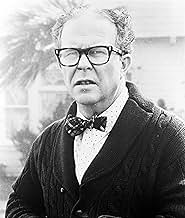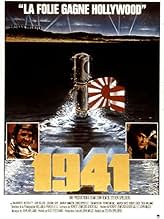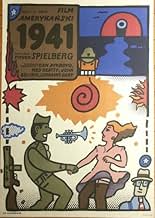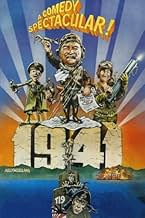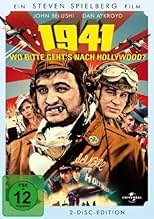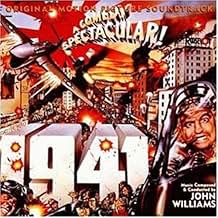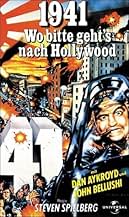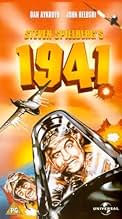VALUTAZIONE IMDb
5,8/10
37.874
LA TUA VALUTAZIONE
I californiani isterici si preparano per un'invasione giapponese nei giorni successivi a Pearl Harbor.I californiani isterici si preparano per un'invasione giapponese nei giorni successivi a Pearl Harbor.I californiani isterici si preparano per un'invasione giapponese nei giorni successivi a Pearl Harbor.
- Regia
- Sceneggiatura
- Star
- Candidato a 3 Oscar
- 6 candidature totali
Toshirô Mifune
- Cmdr. Akiro Mitamura
- (as Toshiro Mifune)
Lucille Benson
- Gas Mama (Eloise)
- (as Lucille Bensen)
Jordan Cohen
- Macey Douglas
- (as Jordan Brian)
Elisha Cook Jr.
- The Patron (Dexter)
- (as Elisha Cook)
Recensioni in evidenza
With all the stars in this movie, it's bound to be full of laughs. In one of the greatest comedies ever made (in my mind), a group of American Army soldiers, a lunatic pilot (Belusi), and local citizens take on each other and a submarine full of incompetent Japanese sailors with victory in their eyes. With an unbelievable collection of actors, and probably a film that Spielberg would like to forget he made, 1941 ranks up there with Caddyshack and other classic comedies.
There comes a time in every new filmmaker's career when a few initial successes makes them feel invulnerable and leads them to believe that they can do anything and get away with it, only for their hubris to be mercilessly destroyed when their next project turns out to be an absolute disaster.
1941 is an end product of Steven Spielberg's hubris that presents the now revered filmmaker tackling the genre of comedy after finding astonishing success with Jaws & Close Encounters, but this time he spectacularly fails at it. Arguably the worst film of his career, 1941 is nothing less than an eyesore.
Set during the Second World War, the story of 1941 follows the hysteria that grips the Californians in the wake of the bombing of Pearl Harbour. As paranoia sets in & chaos erupts all over the state, civilians & soldiers prepare for the Japanese invasion, while a lost Japanese submarine sends its crew to scout out the madness.
Directed by Steven Spielberg, 1941 finds the director trying way too hard in an effort to make the audience laugh but he only ends up making a mess of everything in the process. It appears as if Spielberg simply wanted to blow everything up and had his wish fulfilled with this big budget, big cast comedy that isn't even remotely funny.
The film is an exaggeration of everything. All the set pieces are either destroyed or blown up by the end. People keep falling here n there throughout the movie. All the characters are hyperactive. Performances are equally crazy, and not in a good way. Still, its energetic camerawork, extravagant special effects & John Williams' score is a plus.
On an overall scale, 1941 is a poorly conceived, awfully written & terribly executed example of blockbuster filmmaking and is a rare failure from a filmmaker who would later go on to become one of the greatest storytellers of all time. In retrospect, it's a bitter medicine that Spielberg needed, for 1941 didn't just knock some sense back into him and sober him up but also made him savour his future successes and not take his reputation for granted. A necessary dud.
1941 is an end product of Steven Spielberg's hubris that presents the now revered filmmaker tackling the genre of comedy after finding astonishing success with Jaws & Close Encounters, but this time he spectacularly fails at it. Arguably the worst film of his career, 1941 is nothing less than an eyesore.
Set during the Second World War, the story of 1941 follows the hysteria that grips the Californians in the wake of the bombing of Pearl Harbour. As paranoia sets in & chaos erupts all over the state, civilians & soldiers prepare for the Japanese invasion, while a lost Japanese submarine sends its crew to scout out the madness.
Directed by Steven Spielberg, 1941 finds the director trying way too hard in an effort to make the audience laugh but he only ends up making a mess of everything in the process. It appears as if Spielberg simply wanted to blow everything up and had his wish fulfilled with this big budget, big cast comedy that isn't even remotely funny.
The film is an exaggeration of everything. All the set pieces are either destroyed or blown up by the end. People keep falling here n there throughout the movie. All the characters are hyperactive. Performances are equally crazy, and not in a good way. Still, its energetic camerawork, extravagant special effects & John Williams' score is a plus.
On an overall scale, 1941 is a poorly conceived, awfully written & terribly executed example of blockbuster filmmaking and is a rare failure from a filmmaker who would later go on to become one of the greatest storytellers of all time. In retrospect, it's a bitter medicine that Spielberg needed, for 1941 didn't just knock some sense back into him and sober him up but also made him savour his future successes and not take his reputation for granted. A necessary dud.
i can't believe some of the comments on this movie. did someone really think this was supposed to be an accurate portrayal of wwii california? IT'S A COMEDY! and a good one. i agree that the christmas tree scene shouldn't have been cut, but then again maybe spielberg didn't want to undermine the gritty realism that some reviewers were looking for. p.s. - by far it's mickey rourke's best role.
1941 is a unique movie. 1 part of it is animal house-esque lowbrow humor, 1 part is B-movie love story, and 1 part stoic war movie, and 2 parts insane hilarity.
It is a weird mix to say the least.
First, the problems: 1. The first half of the movie is slow. It grinds on making you wonder why you're watching this movie.
2. The "Love story" subplot is poorly executed for what this movie is trying to do.
3. many of the actors are not used to their fullest potential (especially Dan Akroyd and John Candy) while others receive excessive screen time. (see: The slow moving love story sub-plot) But then there are the good aspects: 1. John Belushi is hilarious. He would have been funnier had he interacted with more characters rather than appearing in many solo shots, but he was funny.
2. The "Epic Battle" was great. It had me laughing as my sides hurt.
3. Slim Pickens: His appearance in the movie was truly where the movie stopped being slow, and the fun really started. He was great in his scenes and between the dialogue and his visual scenes, you can't help but laugh.
There's more, but in short, if you don't mind sitting through a slow build up, the payoff is worth the wait.
It's not the best movie ever, but in the barren entertainment landscape that is Weekend Television: Finding this movie can be like an oasis in the desert. It's solid Saturday afternoon fun.
It is a weird mix to say the least.
First, the problems: 1. The first half of the movie is slow. It grinds on making you wonder why you're watching this movie.
2. The "Love story" subplot is poorly executed for what this movie is trying to do.
3. many of the actors are not used to their fullest potential (especially Dan Akroyd and John Candy) while others receive excessive screen time. (see: The slow moving love story sub-plot) But then there are the good aspects: 1. John Belushi is hilarious. He would have been funnier had he interacted with more characters rather than appearing in many solo shots, but he was funny.
2. The "Epic Battle" was great. It had me laughing as my sides hurt.
3. Slim Pickens: His appearance in the movie was truly where the movie stopped being slow, and the fun really started. He was great in his scenes and between the dialogue and his visual scenes, you can't help but laugh.
There's more, but in short, if you don't mind sitting through a slow build up, the payoff is worth the wait.
It's not the best movie ever, but in the barren entertainment landscape that is Weekend Television: Finding this movie can be like an oasis in the desert. It's solid Saturday afternoon fun.
Steven Speilberg once asked a friend of mine, "Why didn't anyone like this movie?" Well, I think that I can answer that - "1941" is a gigantic in-joke. The people who are in on the joke are people who, like myself, have an oversized love and knowledge of the city of Los Angeles and it's history. I think that in the vast, world-wide movie-going public, this group probably comprises 1%. For that group, "1941" has a wonderful nostalgia value. And for the people in that 1% that have a twisted sense of humor and enjoy seeing nostalgic L.A. blown to bits, this movie really delivers. By the way, the folks with that twisted sense of humor probably account for about 1% of the original 1%.
I don't know why, but having grown up in L.A. and being an aficionado of it's history, I find it funny to see planes in a dogfight over Hollywood Blvd, the ferris wheel rolling off the end of Santa Monica Pier, and aircraft crashing into the La Brea Tarpits. But for non-locals and people unfamiliar with the paranoia that gripped Southern California in the wake of Pearl Harbor, this movie will likely seem confusing and silly. To the history buff with a twisted sense of humor (like me, proud member of the 1% of the 1%), the movie is not only amusing, but sometimes surprisingly accurate, historically. Robert Stack plays General Joseph Stillwell - a very real historical figure in L.A. history. Stack even bears a striking resemblance to the real General Stillwell. The whole movie is based upon a few real-life incidents of panicky anti-aircraft fire that occurred over L.A. in 1941/1942, as well as a Japanese sub that actually shelled an oil refinery near Santa Barbara. Like "Chinatown" (a film mistakenly thought to be an accurate account of L.A. water politics in the 1930s), "1941" borrows from real-life history and distorts it into pure fabrication. The difference is that while "Chinatown" is a noir drama, "1941" is an over-the-top comedy. Both films appeal to the historian, but as it is often said, comedy is much harder to pull off than drama. You either love "1941", or sit though it, saying, "huh?".
I don't know why, but having grown up in L.A. and being an aficionado of it's history, I find it funny to see planes in a dogfight over Hollywood Blvd, the ferris wheel rolling off the end of Santa Monica Pier, and aircraft crashing into the La Brea Tarpits. But for non-locals and people unfamiliar with the paranoia that gripped Southern California in the wake of Pearl Harbor, this movie will likely seem confusing and silly. To the history buff with a twisted sense of humor (like me, proud member of the 1% of the 1%), the movie is not only amusing, but sometimes surprisingly accurate, historically. Robert Stack plays General Joseph Stillwell - a very real historical figure in L.A. history. Stack even bears a striking resemblance to the real General Stillwell. The whole movie is based upon a few real-life incidents of panicky anti-aircraft fire that occurred over L.A. in 1941/1942, as well as a Japanese sub that actually shelled an oil refinery near Santa Barbara. Like "Chinatown" (a film mistakenly thought to be an accurate account of L.A. water politics in the 1930s), "1941" borrows from real-life history and distorts it into pure fabrication. The difference is that while "Chinatown" is a noir drama, "1941" is an over-the-top comedy. Both films appeal to the historian, but as it is often said, comedy is much harder to pull off than drama. You either love "1941", or sit though it, saying, "huh?".
Lo sapevi?
- QuizSome scenes were so noisy during filming that the crew could not hear Steven Spielberg yell "Cut". He had to fire a prop machine gun in the air to get the action to stop.
- BlooperHerbie and Claude change position on the ferris wheel. Spielberg did that deliberately for comedic effect.
- Citazioni
Japanese soldier: [trying to squeeze a large radio into the sub] We've got to figure out how to make these things smaller!
- Curiosità sui creditiEnd credits feature scenes showing cast members screaming.
- Versioni alternativeThe version released on network television and VHS/DVD/laserdisc is Spielberg's original director's cut, running 146 minutes, fleshing out sub-plots and characterizations, including:
- Wally and Dennis getting thrown out onto the street by Mr. Malcomb after he fires them from the diner where they work.
- Miss Fitzroy lecturing a group of women, Betty and Maxine among them, about tonight's USO dance which is interupted by a group of Army service men and Sailors entering and chanting wanting the women.
- A department store scene with Wally fussing about buying an expensive new zoot suit and Dennis sounding a phoney air-raid siren which leads to panic in the store including a gun-toting Santa Claus yelling out command orders which is revealed to be a set up by Wally who walks out of the store wearing the zoot suit while Dennis meets the twin girls for the first time.
- A scene with Scioli outside his house arguing with his non-English speaking wife about converting their car into an armored car while talking with Claude about sending him and someone else atop the Santa Monica ferris wheel on a spot mission for Japanese planes.
- A extra scene with Ito and the I-19 Japanese submarine shore party disguising themselves as Christmas trees in a remote Christmas tree lot and the drunken Hollis Wood trying to "chop" them down which leads to his capture.
- Scioli arriving at the ferris wheel with Claude and Herbie and explaing to them about their mission in the ferris wheel.
- A dinner scene at the Douglas home and Ward explaining to Betty about her going to the USO dance and telling her about the pros and cons about meeting servicemen.
- A barracks scene with Odgen Johnson Jones arriving for the first time at the barracks and imediately quarling with the racist Foley about property lines within their quarters.
- A scene outside the USO club where Wally arrives and meets with Martinez and his Zoot Suit friends where they are denied access to the club where Corporal Stretch shows up and sets Wally's zoot suit afire which nearly leads to a riot between the Zoot Suiters and the Servicemen. Wally then meets Dennis dressed up as a Marine in order to gain entrance into the club with the twins as his dates.
- Additional dialoge between Captain Birkhead and Donna in their car on the way to the airstrip and being afraid of the dark.
- Another barracks scene where Sergeant Tree breaks up a fistfight between Jones and Foley by informing them about the riot on Hollywood Blvd. and showing them climing into their tank and starting it up.
- A scene of the Japanese submarine I-19 arriving for the first time outside the Douglas house and the sub's entire crew on the deck watching Joan Douglas taking a bath through the bathroom window.
- A scene of the tank traveling down a residential street and Wally shooting up Officer Miller's police car to pieces, sending the policeman and some paserby's running for their lives.
- ConnessioniFeatured in At the Movies: Special Show: The Magic of Spielberg (1984)
- Colonne sonoreDown by the Ohio
Music by Abe Olman (uncredited)
Lyrics by Jack Yellen (uncredited)
Performed by The Andrews Sisters
Courtesy of MCA Records, Inc.
I più visti
Accedi per valutare e creare un elenco di titoli salvati per ottenere consigli personalizzati
Dettagli
- Data di uscita
- Paese di origine
- Lingue
- Celebre anche come
- 1941
- Luoghi delle riprese
- Gold Beach, Oregon, Stati Uniti(opening scene with sub)
- Aziende produttrici
- Vedi altri crediti dell’azienda su IMDbPro
Botteghino
- Budget
- 35.000.000 USD (previsto)
- Lordo Stati Uniti e Canada
- 31.755.742 USD
- Fine settimana di apertura Stati Uniti e Canada
- 2.701.898 USD
- 16 dic 1979
- Lordo in tutto il mondo
- 92.455.742 USD
- Tempo di esecuzione
- 1h 58min(118 min)
- Colore
- Proporzioni
- 2.39 : 1
Contribuisci a questa pagina
Suggerisci una modifica o aggiungi i contenuti mancanti


